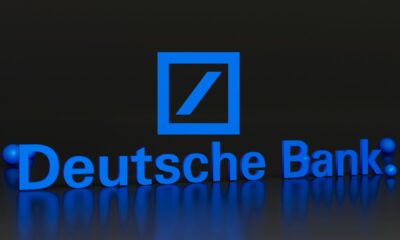Featured
Deutsche Bank to partner with the fintech company Deposit Solutions
Customers of the German bank should soon be able to enjoy the higher interest rates of foreign banks in private asset management too. Interestingly enough, a participation by the major shareholder Cerberus will benefit from this. Deutsche Bank assured that the investor Cerberus did not play any role in the selection of banks connected to the interest rate market.

Deutsche Bank now wants to pass on its well-heeled clientele to other banks that offer higher interest rates than it does itself. To this end, it is significantly expanding its cooperation with Hamburg-based Fintech Deposit Solutions. Up to now, only online banking and app customers have had the option of transferring part of their deposits to other banks via the “interest market.” Currently, the bank wants to offer this service in private asset management as well and include it in its advisory services in its (currently largely closed) branches.
What’s piquant about it is that a major shareholder of Deutsche Bank benefits from the cooperation. One of the three banks to which clients are referred belongs to the private equity firm Cerberus, which has held just over 3% of Germany’s largest bank since November 2017.
Fintech Deposit Solutions, which was founded in 2011, offers a platform called Zinspilot that allows investors to open overnight and fixed-term deposit accounts with foreign banks in an uncomplicated manner. These accounts are often opened in rather exotic financial centers such as Romania, Latvia, and Malta, where interest rates are somewhat higher than in Germany. Investors must rely on the promise that in these countries, too, European deposit protection will guarantee up to $109,000 (€100,000) in the event of a bank failure.
Find out more about Deutsche Bank’s partnership with the Fintech Deposit Solutions and read the most important business headlines with our companion app, Born2Invest.
My Money Bank and Deutsche Pfandbriefbank are also on the platform
Deutsche Bank, together with Fintech Deposit Solutions, offers its clients a greatly reduced version under the name Zinsmarkt. Currently, only three banks from France and Germany are connected to the platform; 22 deposit products come together over various maturities. Of interest is the French My Money Bank, which emerged from GE Money Bank, which was acquired by Cerberus in 2017.
According to its own statements, it is now entirely supported by Cerberus funds and uses its customers’ money to grant loans to customers in French overseas territories such as La Réunion and the Antilles, among other things. Anyone who entrusts the bank with fixed-term deposits for five years via the interest market of Deutsche Bank receives 0.8% interest per year, and 0.6% for three years.
At least at present, My Money Bank offers the best interest rate on the interest market for any term, so most customers are likely to choose its offers. The other two banks on the platform are the online arm of Deutsche Pfandbriefbank, which emerged from the crisis bank Hypo Real Estate, and Credit Plus, a German subsidiary of the French Crédit Agricole. The former HSH Nordbank, which is now called Hamburg Commercial Bank, has also already used the platform to access customer deposits at favorable terms and thus increase its liquidity – the bank is also largely owned by Cerberus.
Deutsche Bank assured that the investor Cerberus did not play any role in the selection of banks connected to the interest rate market. However, the American financial investor had already taken out unusual special rights in the bank in the past. For example, the senior Cerberus manager Matt Zames had a consultancy contract for the bank and, according to the official statement, was supposed to help it to use its liquidity more profitably.
The banks connected to the interest rate market are in the Eurozone
When selecting the banks connected to the interest rate market, it is important that they are located in the Eurozone and have a certain minimum credit rating, said Markus Pertlwieser, Head of Digitization in the Private Client Business of Deutsche Bank. “The advantage for the partner banks is that they can obtain liquidity cheaply without having to do a lot of marketing themselves. And Deutsche Bank takes over the regulatory review of the client.”
Deutsche Bank receives a commission for passing on the funds. In case of doubt, the client must also rely on the guaranteed deposit protection of €100,000. Deutsche Bank expressly offers no further protection for the money invested in this way. The only advantage for the customer should be that he does not have to open a new account himself and his account balance at the partner bank is integrated into his usual Deutsche Bank statements.
Since 2017, Deutsche Bank has enabled its online customers to receive higher interest rates on their deposits in this way. $2.95 billion (€2.7 billion) have already been invested via the interest market, as Pertlwieser says. At the same time, some customers are shifting quite considerable sums to other banks. According to Pertlwieser, customers invest $54.500 (€50,000) on average. “Although it has been a pure online product so far, the typical interest market customer is not 18 years old and a beginner, but on average between 40 and 50 years old”, said Pertlwieser.
Therefore, it is now time to offer the product to customers in the branches as well as in private asset management. The first deals have already been concluded. Sooner or later, the offer is to be rolled out to the rest of the group as well, with the online bank Norisbank to follow as early as the second quarter. Pertlwieser does not yet want to decide when the interest market will also be made available to Postbank customers.
__
(Featured image by Hans via Pixabay)
DISCLAIMER: This article was written by a third party contributor and does not reflect the opinion of Born2Invest, its management, staff or its associates. Please review our disclaimer for more information.
This article may include forward-looking statements. These forward-looking statements generally are identified by the words “believe,” “project,” “estimate,” “become,” “plan,” “will,” and similar expressions. These forward-looking statements involve known and unknown risks as well as uncertainties, including those discussed in the following cautionary statements and elsewhere in this article and on this site. Although the Company may believe that its expectations are based on reasonable assumptions, the actual results that the Company may achieve may differ materially from any forward-looking statements, which reflect the opinions of the management of the Company only as of the date hereof. Additionally, please make sure to read these important disclosures.
First published in Frankfurter Allgemeine, a third-party contributor translated and adapted the article from the original. In case of discrepancy, the original will prevail.
Although we made reasonable efforts to provide accurate translations, some parts may be incorrect. Born2Invest assumes no responsibility for errors, omissions or ambiguities in the translations provided on this website. Any person or entity relying on translated content does so at their own risk. Born2Invest is not responsible for losses caused by such reliance on the accuracy or reliability of translated information. If you wish to report an error or inaccuracy in the translation, we encourage you to contact us.

-

 Cannabis1 week ago
Cannabis1 week agoCannabis Clubs Approved in Hesse as Youth Interest in Cannabis Declines
-

 Impact Investing2 weeks ago
Impact Investing2 weeks agoFrance’s Nuclear Waste Dilemma Threatens Energy Future
-

 Crowdfunding2 days ago
Crowdfunding2 days agoWorld4All, a Startup that Makes Tourism Accessible, Surpasses Minimum Goal in Its Crowdfunding Round
-

 Fintech2 weeks ago
Fintech2 weeks agoKraken Launches Krak: A Game-Changing Peer-to-Peer Crypto Payment App

























